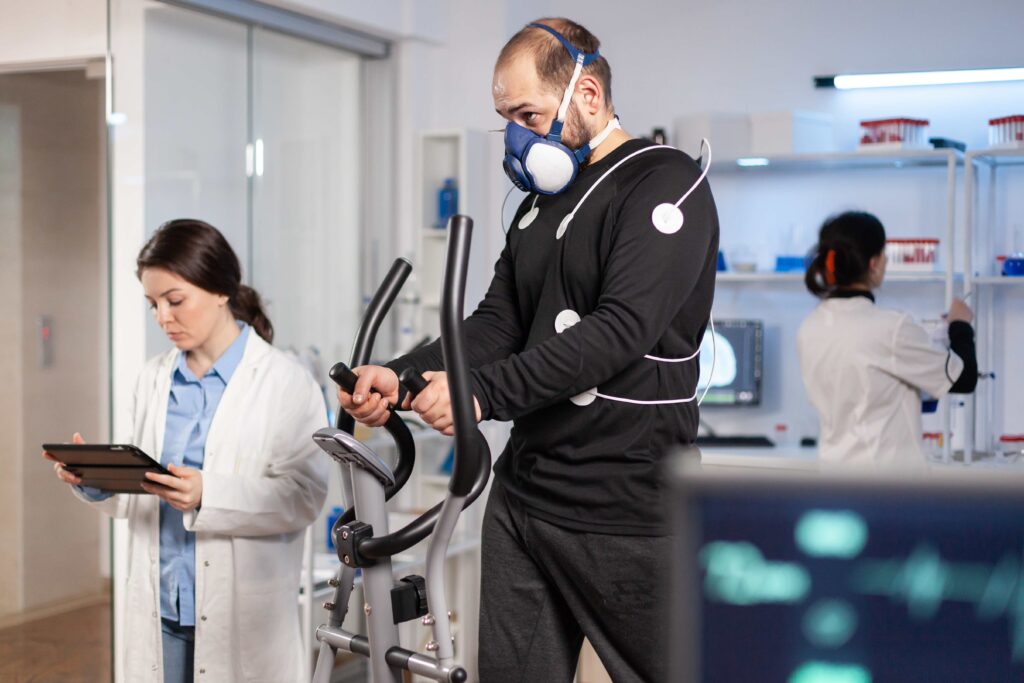Metabolic Testing And Tracking
Cracking the Code of Metabolic Testing
Ever wondered how your body burns calories and uses energy? That’s where metabolic testing steps in. So, what’s the big deal about it?
Why Bother with Metabolic Testing
Metabolic testing measures how much oxygen you take in and how much carbon dioxide you breathe out during exercise.
This info helps figure out your fitness level and what you might need to tweak to hit your goals. Plus, it tracks lactate in your blood—a sign of how hard your muscles are working.
Knowing your metabolic rate lets you make smarter choices about your diet, exercise, and even sleep. It gives you a peek into how well you burn fat, the health of your heart and lungs, and more.
What’s in a Metabolic Test?
Resting Metabolic Rate (RMR) Test: This measures how many calories you burn just by being alive—like when you’re chilling on the couch.
VO2 Max Test: Also called the anaerobic capacity test, it checks how much oxygen you use during exercise. This helps you understand how your body handles different workout intensities and how many calories you burn (Everlywell).
Lactate Threshold Test: This one measures when your muscles start to feel the burn from lactic acid buildup. It’s usually for athletes and involves some serious exercise and blood tests.
What Affects Your Metabolism
Your metabolism isn’t just a buzzword; it’s the engine that keeps your body running. Knowing what revs it up or slows it down can be a game-changer for your health. Let’s break down three big players: muscle mass, age, and gender.
Muscle Mass: The Calorie Burner
Got muscles? Great! They’re like little calorie-burning machines. Muscles need more energy than fat, so the more you have, the more calories you burn—even when you’re binge-watching your favorite show. That’s why lifting weights or doing resistance training can give your metabolism a nice boost. Think of it as turning your body into a calorie-burning furnace.
The Metabolism Slowdown
Ever feel like your metabolism hit the brakes as you got older? You’re not imagining it. As we age, we tend to lose muscle and gain fat, slowing down our metabolic rate. Kids, on the other hand, burn through calories like there’s no tomorrow, thanks to their rapid growth. So, staying active and eating right becomes even more crucial as the years roll by.

Gender: Men vs. Women
Sorry ladies, but men generally have a faster metabolism. It’s not just a myth; men usually have more muscle and less fat, which means they burn more calories. This difference is why weight management plans often need to be personalized. What works for one person might not work for another, especially across genders (Envision Fitness).
Wrapping It Up
So, muscle mass, age, and gender all play a big role in how your metabolism works.
Knowing this can help you make smarter choices about your health. Whether it's hitting the gym, tweaking your diet, or just understanding your body's needs better, these insights can set you on the path to a healthier, more vibrant life.
Lifestyle and Metabolism
Your lifestyle has a huge impact on your metabolism. What you eat, how you move, and even your genetic makeup can all play a part. Knowing these factors can help you make smarter choices about your health.

How Exercise Affects Metabolism
Exercise is a big deal when it comes to speeding up your metabolism. Regular workouts build muscle, which burns more calories even when you’re chilling on the couch. High-intensity interval training (HIIT) is especially good for this. It keeps your muscles burning energy long after you’ve finished your workout, helping you shed fat and build muscle.
Food and Metabolism
What you eat can also crank up your metabolism. Protein is a superstar here—it takes more energy to digest compared to carbs and fats. This means you burn more calories just by eating protein. Plus, it helps you keep muscle while dieting (Healthline).
Changing your daily habits, like getting more active and eating better, can really make a difference in your metabolism and your weight over time (Healthline)
Ectomorphs have a fast metabolism and often struggle to gain weight or muscle. They need a nutrient-rich diet with complex carbs, proteins, veggies, fruits, and healthy fats. Weight training is key for them to build muscle.
Knowing your body type and adjusting your lifestyle can make a big difference in your health journey. Metabolic testing can give you personalized insights to help you reach your goals.
Different Metabolic Body Types
We all have different body types that affect how we gain or lose weight. There are three main types: endomorphs, mesomorphs, and ectomorphs. Each type needs a different approach to diet and exercise.
Endomorphs usually have a slower metabolism and find it harder to lose weight. They tend to hold onto fat and are more sensitive to carbs and insulin. Foods that keep blood sugar steady are best for them.
Mesomorphs have a more athletic build with more muscle and less fat. They respond well to exercise and can eat a moderate amount without gaining weight. A balanced diet with complex carbs, lean proteins, fruits, veggies, and healthy fats works well for them(Your Wellness Center).
Ectomorphs have a fast metabolism and often struggle to gain weight or muscle. They need a nutrient-rich diet with complex carbs, proteins, veggies, fruits, and healthy fats. Weight training is key for them to build muscle.
Knowing your body type and adjusting your lifestyle can make a big difference in your health journey. Metabolic testing can give you personalized insights to help you reach your goals.

Boosting Your Metabolism
Getting your metabolism to work like a well-oiled machine is key to staying fit and feeling full of beans. It’s all about making your body burn calories more efficiently. Let’s chat about how protein, high-intensity interval training (HIIT), and weight training can give your metabolism a kick in the pants.
The Metabolism Booster
Eating more protein can seriously rev up your metabolism. Why? Because your body uses 20-30% of the energy from protein just to digest it, compared to a measly 5-10% for carbs and a paltry 0-3% for fats. Plus, protein helps you hang onto muscle when you’re dieting, which is a double win for your metabolic health.
The Metabolic Firestarter
High-intensity interval training (HIIT) is like rocket fuel for your metabolism. Studies show that HIIT helps your muscle cells burn more energy even when you’re chilling on the couch. It’s more effective at this than other types of exercise. So, adding HIIT to your workout routine can really crank up your metabolic rate.
The Muscle Builder
Lifting weights isn’t just for bodybuilders. Building muscle through weight training can make your metabolism work harder, burning more calories even when you’re not moving. Muscle needs more energy to maintain than fat, so the more muscle you have, the higher your metabolic rate. Incorporate some weight training into your fitness plan to keep your metabolism humming.
Remember, boosting your metabolism isn’t a sprint; it’s a marathon. It takes time and consistency. But with the right habits, you can supercharge your metabolism, feel more energetic, and improve your health. And hey, if you want to get really personal with it, metabolic testing can give you insights tailored just for you.

Metabolic Testing and Tracking
Ready to feel more alive and energetic? Understanding how your body uses energy is a big part of that. Metabolic testing and tracking can give you the lowdown on your body’s energy needs, how well it burns calories, and more.
Why Track Your Metabolism?
Tracking your metabolism can be a total game-changer for weight loss. It tells you how well your body burns calories, what your energy needs are, and the best mix of carbs, fats, and proteins for your goals. This means you can lose weight more effectively (BodyByBariatrics).
Plus, it helps you dodge common weight loss mistakes. If your metabolism has slowed because you’re eating too little, tracking can show you. It can also help you bust through weight loss plateaus by pointing out what needs tweaking. This way, you can make real-time changes for better results.
RPM Metabolic Tracking
RPM Metabolic Tracking gives you a deep dive into your metabolism. It looks at more than just your weight and BMI. It checks out how much energy you use, how well you burn fat, and more, all without any invasive procedures. It’s easy and accessible for everyone.
RPM measures things like your heart rate, muscle mass, belly fat, blood vessel health, water levels, hydration, and metabolic age. All this info gets analyzed to give you a full picture of your metabolism, helping you lose weight more effectively.
Personalized Metabolic Insights
RPM Metabolic Tracking uses cutting-edge tech and science to give you accurate, personalized insights into your metabolism. It helps you lose weight by letting you monitor and adjust in real-time, giving you a treasure trove of personalized info. Take the Resting Metabolic Rate (RMR) Test, for example. It measures how many calories your body burns while you’re just chilling. This helps you know how many calories you burn at rest. Then there’s the VO2 max test, which measures how much oxygen you use during exercise. This helps you understand how your body uses oxygen based on how hard you’re working out, and it estimates how many calories you burn during exercise. With these personalized insights, you can make smarter choices about your diet, workouts, and lifestyle. Choosing OneSite Wellness in Charlotte, NC for your metabolic testing and tracking can be your first step toward a healthier, more energetic life.
Comprehensive Metabolic Panel (CMP)
A Comprehensive Metabolic Panel (CMP) is a crucial blood test that gives you a snapshot of your overall health. It measures 14 different substances in your blood, like proteins, enzymes, electrolytes, and minerals. Let’s break down what a CMP is, why it’s useful, and how to make sense of the results.
What is a CMP?
A CMP checks 14 substances in your blood, including proteins, enzymes, electrolytes, and minerals. These substances are vital for keeping your body in balance. The test looks at things like liver and kidney function, blood sugar levels, and essential minerals.
Why Get a CMP?
Doctors order CMPs for many reasons. It’s often part of routine check-ups and can help diagnose or monitor health conditions or medication side effects (Cleveland Clinic). Here’s what a CMP can tell you:
- Liver function: Checks for liver diseases or damage.
- Kidney function: Monitors how well your kidneys are working.
- Electrolyte levels: Ensures your body has the right balance of minerals.
- Glucose levels: Measures blood sugar, which is crucial for diagnosing diabetes.
- Calcium levels: Important for bone health and other bodily functions.
These measurements give doctors a full picture of your metabolic health, helping them catch potential issues early.
Making Sense of CMP Results
You usually get your CMP results within a couple of days (Cleveland Clinic). The results can be tricky to interpret because abnormal levels might mean different things. Plus, factors like your diet or medications can affect the results. It’s best to go over your results with your doctor. They can explain what the numbers mean for your health, considering your lifestyle and medical history. This helps you understand any issues and decide on the next steps. Regular CMP tests can keep you on top of your health, helping you catch problems early and make informed choices about your lifestyle and treatments. It’s a simple step that can make a big difference in staying healthy and energetic.
